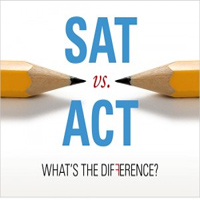Both the SAT and the ACT are standardized tests that help colleges and universities determine how prepared you are, as a student, to take college-level courses.
At first glance, the two tests don’t look very different. They take a similar amount of time to complete (between 3 hours and 35 minutes for the ACT, around 3 hours and 50 minutes for the SAT), and they cover all the same basic subjects: reading, writing, comprehension, problem solving, and mathematics.
Also, all universities and colleges in the US accept both the ACT and the SAT, so taking one test over the other doesn’t offer any advantages. Despite all their similarities, there are also some surprising differences that may affect your choice.
Here is a list of the distinct differences:
Time Per Section:
Each section of the test is given a different amount of time. Unlike the ACT, the SAT allows more time per question for every section of the test
Range of Scores:
The ACT scores each section on a scale of 1-36, while the SAT scores each section on a scale of 200-400, with a total score ranging from 400-1600 points.
The Science and Math Sections:
The ACT features a unique section: the science section. The SAT and ACT contain sections devoted to reading and writing, but the SAT contains two mathematics sections (one with a calculator and one without), while the ACT contains one math and one science section.
Both tests have outstanding math sections. Neither test focuses heavily on algebra, but like the SAT, the ACT also includes a section on geometry and trigonometry, and the ACT allows calculators for all sections (whereas the SAT has only one math section that does not).
Command of Evidence Questions:
A major difference between the two tests is how the questions are arranged. SAT reading section includes a unique sub-section that asks you to support your claim with evidence, and each question is chronologically ordered according to the text it references. Evidence-based questions are not included in the ACT and they are arranged randomly in accordance with the paragraph they reference.
ACT Overview:
The ACT is a college entrance exam that many colleges and universities in the United States use as part of the college admissions process. The ACT is a standardized test that assesses students’ skills in five core areas: English, Math, Reading, Science, and Writing (optional). From the date of testing, ACT scores are valid for five years.
ACT Exam Details:
ACT Scoring System:
- Subject Score: There are 4 subject scaled scores.
- Grouped Score: STEM (Maths + Science) and ELA (English + Reading + Essay*).
- Composite Score: Average of all subjects (English + Math + Reading + Science) scaled score.
*If you take the ACT with Writing, then your essay will not be factored into the composite score.
NA – Not Applicable
SAT Overview:
Colleges and universities generally consider the SAT in the admissions process as a standardized test for high school students. These students can take the test from 9th to 12th grade. In junior year, most students take the test. Since high school junior and senior years are busy it’s hard for students to keep up with all the activities.
SAT Exam Details:
SAT Scoring System:
- Test/Subject Score: There is 4 subjects’ scaled score.
- Section/Grouped Score: EBRW- Evidence-Based Reading and Writing (Reading + Writing & Language) and Math Composite (Math).
- SAT Total Score: {(Reading Scale Score + Writing & Language Scale Score) *10 + Math*20} or (EBRW + Math) Section Scores.
* If you take the SAT with an essay, your essay will not factor into the Total or Section scores.
SAT vs. ACT Overall Comparison
| ACT | SAT | |
| Number of Question | 215 | 154 |
| Length of Assessment | 3 hours 35 minutes | 3 hours 15 minutes |
| Scoring Scale | 1-36 | 400-1600 |
| Sections | Math (Calculator and Non-Calculator), Reading and Writing | Math, Reading, Writing, and Optional Essay |
| Test Dates | Four times per year – March, May, October, and December | Six times per year – February, April, June, July, September, and October |
To learn more about the SAT or ACT test download SAT and ACT free eBook to learn the strategy to score high in SAT and ACT exams.














